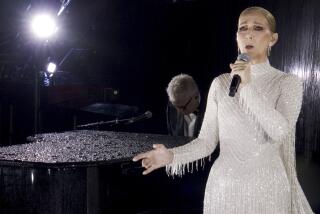‘The screen door slams, Mary’s dress...’ waves? Sways? An investigation into the Boss’ mystery verb

- Share via
The internet doesn’t seem to know the correct lyrics to Bruce Springsteen’s “Thunder Road.” It’s possible Springsteen doesn’t know either.
The latest niche Twitter controversy began on July 3, when New York Times political reporter Maggie Haberman tweeted a photo of an empty theater stage and the words “A screen door slams, Mary’s dress sways.” Followers understood that she was attending Springsteen’s Broadway solo show, and quickly admonished her for mangling the lyrics.
“Kinda crazy you goofed up both lines,” snarked @hansbungle. And it does seem clear that Haberman made at least one mistake: The song begins, “The screen door slams.” But what about the second line? Haberman rendered it, presumably from memory, as “sways.” Some Tweeters insist she’s correct, while others, outraged, contend that the lyric is “Mary’s dress waves,” and demand a correction, if not a summary execution. “Thunder Road” is the epic, dawn-of-the-day song that begins “Born to Run,” the 1975 album that made Springsteen a star, and it’s so cherished a song that people find it worth arguing about.

The flap even reached Springsteen’s bandmate and long-time pal Stevie Van Zandt, who tweeted, “Oy vey! Get this Bruce lyric shit outta my feed!”
Springsteen himself has carefully removed any doubt from the matter. In the original album gatefold design of “Born to Run,” the lyrics are printed: “Mary’s dress waves.” The booklet of the CD reissue says the same. So does his official website, brucespringsteen.net, and his official songbook, “Bruce Springsteen: Songs.” And right here, on page 220 of his best-selling “Born to Run” memoir, Springsteen ends the argument. “‘The screen door slams, Mary’s dress sways’ — that’s a good opening line,” he writes. There you go, case closed, no need to continue this ridiculous —
Wait, what?
Either Springsteen got the lyrics wrong in his own memoir, or he and his notoriously fastidious management team routinely signed off on misprinted lyrics. Both scenarios seem unlikely.
John Mayer’s ‘Sob Rock’ conjures the era of pastel color schemes and Bret Easton Ellis bestsellers, but beneath the surface lie songs of increased maturity.
We like to think we’re long past the days when rock lyrics were mysteries, and a person might live years thinking Jimi Hendrix sang “Excuse me while I kiss this guy” and Creedence Clearwater Revival saw a bathroom on the right. A plethora of lyrics sites take away the guess work and settle barroom arguments.
Popular lyric sites Genius.com and AZlyrics.com go with “sways,” but such sites sometimes perpetuate incorrect lyrics, which then spread onto other, smaller lyrics sites. In 2019, Sotheby’s auctioned Springsteen’s handwritten lyrics for $62,500. On the page, in cursive, Springsteen wrote, “The screen door slams Anne dress sways.” More evidence for “sways,” except Springsteen was a compulsive rewriter, and the name Anne makes it clear that these were only draft lyrics. In other versions of the song, he tried the names Angelina and Chrissie before settling on Mary.
When he performed on the VH1 series Storyteller in 2005 and read the lyrics aloud, he almost certainly said “sways.” At other times, he seems to half-heartedly sing a vague “way.” Springsteen is not one of rock’s great enunciators, and because “dress” ends with a sibilant S, “suh-ways” is difficult to distinguish from “suh-waves.” So the topic is up for debate, right?

“I can’t believe this is even up for debate,” says Caryn Rose, author of the 2012 book “Raise Your Hand: Adventures of an American Springsteen Fan in Europe” and a long-time contributor to Backstreets, a Springsteen fanzine. “Mary’s dress waves. People who hear ‘sways’ should go get their ears cleaned out.”
Rose recalls hearing the debate as far back as 1999, in groups on Usenet, an internet discussion system. “It’s ancient. And it resurfaces every so often. But to me, the matter is settled.”
Mike Appel was Springsteen’s manager at the time of “Born to Run.” “I heard him sing it I don’t know how many times, and it was always ‘sways,’” the 78-year-old says. He submitted the lyrics when he registered the song with the U.S. Copyright Office. When I mention that the album says “waves,” he’s startled. “Really? Maybe I got it wrong, but I’m pretty damn sure it’s ‘sways.’”
“I sang ‘sways,’” says singer and fiddle player Sara Watkins, who covered “Thunder Road” on the 2019 Springsteen tribute album “Born to Uke.” “But listening to the record again, knowing that it’s a contentious point, I’m 100% clear he sings ‘waves.’ It’s a much richer image — you imagine a breeze, you get a picture of what the day is like. I guess I blew it,” she concludes with a laugh.
Melissa Etheridge didn’t just cover “Thunder Road,” she sang it as a duet with Springsteen on her 1995 episode of MTV Unplugged. “I always sing, ‘Mary’s dress ‘waves,’” she says. “I even talked about the lyrics with Bruce. We were practicing the song and dividing up who would sing what. In the middle of it, he said, ‘Man, there’s no chorus to this song! The lyrics just go on and on!’ But he would’ve told me if it wasn’t ‘waves.’ He would’ve said, ‘You’re singing it wrong, honey.’ So it’s definitely ‘waves.’”
Songwriters who’ve covered the song agree there’s a significant difference between the two words. “My wife and I were just discussing this,” Etheridge says. “‘Sways’ is more feminine.” “’Sways’ is sexier,” adds country star Eric Church.
“Thunder Road” is Church’s favorite Springsteen song. “It had a cinematic quality. It was visual — more than anything else, I could see it. It was more like a book or a movie than a song. Traveling, freedom, desperation — they’re all in there.”
Church covered “Thunder Road” in concert for several years, as a prelude to his most beloved original song, “Springsteen.” “I think Bruce sings ‘waves.’ But it could also be ‘sways.’ I’ve sung it both ways,” he says. That’s not very helpful, Eric. Prodded to make a choice, Church laughs. “If I grabbed a guitar right now, I would do ‘waves.’ Final answer.”
On ‘Am I the Only One,’ the former Staind frontman calls out Bruce Springsteen and asks, ‘Am I the only one willing to bleed / Or take a bullet for being free?’
“I’ve sung this song probably thousands of times,” says San Francisco rocker Matt Nathanson, “and I’ve always sung ‘sways.’ It’s an infinitely better lyric. When you hear ‘waves,’ you see middle America. ‘Waves’ feels like Indiana to me, and ‘sways’ feels like New Jersey.”
Frank Turner, a British singer-songwriter (“I prefer the term entertainer”), first heard Springsteen as a kid, during the “Born in the USA” era, and thought of the singer as “completely ersatz and cheesy.” His mind started to change when a friend gave him a copy of “Nebraska,” the stark, chilling predecessor to “Born in the USA.” And ever since he heard Springsteen do a stripped-down version of “Thunder Road” on VH1 Storyteller, “it’s been a contender for my favorite song ever. It’s the song my wife walked down the aisle to when we got married.”
Turner found a clever solution to the sways-versus-waves debate: “I’ve been known to pointedly sing ‘swaves.’ It’s a middle ground. Like centrism, it pleases nobody.” In concert, he adds, when he sings ‘swaves,’ some fans yell “It’s ‘sways!’” while others shout “It’s ‘waves!’”

Baby boomers, who likely owned first pressings of “Born to Run” on vinyl and memorized the lyrics while cleaning pot in the gatefold, hew closely to an originalist interpretation. “Waves. Let the argument foam and fly,” David Simon, creator of “The Wire,” tweeted. Maggie Haberman, who’s Gen X, doubled down in her reply to Simon: “It’s sways.” Simon parried: “There’s the lyric sheet on the original album. Which kinda settles it.”
Except, of course, that it doesn’t.
There are two approaches that don’t require us to choose one word and banish the other. The first is to embrace postmodernist opposition to interpretation (to interpret a text, Roland Barthes wrote in 1967, “is to impose a limit on that text”) and accept it as an infinite mystery. “Once you release a song, you don’t have control over it anymore. It’s up to the listener to interpret,” says Sara Watkins. “That’s kind of terrifying, but it’s also wonderful.” Poetry, she adds, isn’t just the words on a page, it’s how the poem makes the reader feel. A poem doesn’t exist until someone reads it.
There’s only one person who could put an all-time end to the conversation, but through a spokesperson, Springsteen declined to comment. “It’s almost like he doesn’t want us to know for sure,” Watkins muses.

Matt Nathanson has a theory that also sidesteps the whole brouhaha. Springsteen, he says, is a fabulist. He refers to an admission Bruce makes in his Broadway show: “I come from a boardwalk town where everything is tinged with just a bit of fraud,” he says. “So am I.” Later, Springsteen adds, “I’ve never seen the inside of a factory, and yet, it’s all I’ve ever written about. … I made it all up.”
“Springsteen created himself out of thin air,” Nathanson says. “I’m certain he knew he made a mistake, and he wants to rewrite the song the way it should be. ‘I wrote ‘waves’ and I’m gonna say I wrote ‘sways,’ and people are gonna believe it.’ He held on to ‘waves’ as long as he could, but he realized ‘sways’ was better.”
“It’s his song,” says Turner, “and his to do with as he pleases.”
Maggie Haberman conceded to David Simon shortly after her original tweet, perhaps prematurely. We may never resolve this flap. But it’s delightful that there are still questions Siri and Alexa can’t answer, and that people argue fervently about rock lyrics from more than 45 years ago.
More to Read
The biggest entertainment stories
Get our big stories about Hollywood, film, television, music, arts, culture and more right in your inbox as soon as they publish.
You may occasionally receive promotional content from the Los Angeles Times.








